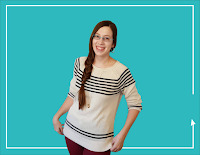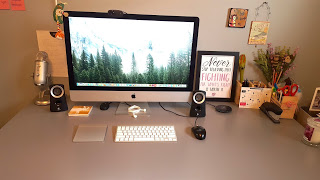I am Echo Rivera and This is How I Work
 Today, I have the pleasure of hosting Dr. Echo Rivera in the “How I Work” series. Echo is the owner of Creative Research Communication (CRC) and a research associate at a nonprofit research/evaluation center in Denver, CO. Her passion is helping researchers, evaluators, academics, and nonprofits communicate their social equity work effectively and creatively. One way she does this is by helping people become more effective visual communicators, so we can end the text-heavy, ineffective presentation status quo. Plus, academics tend to lose steam at the end of a project and often settle with journal articles or academic conferences. Her dream is to add some creativity to the research communication/dissemination process through more science-based personal websites, zines, comics, and other creative outlets.
Today, I have the pleasure of hosting Dr. Echo Rivera in the “How I Work” series. Echo is the owner of Creative Research Communication (CRC) and a research associate at a nonprofit research/evaluation center in Denver, CO. Her passion is helping researchers, evaluators, academics, and nonprofits communicate their social equity work effectively and creatively. One way she does this is by helping people become more effective visual communicators, so we can end the text-heavy, ineffective presentation status quo. Plus, academics tend to lose steam at the end of a project and often settle with journal articles or academic conferences. Her dream is to add some creativity to the research communication/dissemination process through more science-based personal websites, zines, comics, and other creative outlets.
Current Job: (1) Owner, Creative Research Communication and (2) Research Associate at Center for Policy Research
Current Location: Denver, CO
Current mobile device: Samsung S6 Edge
Current computer: iMac, Acer Chromebook, and Windows Desktop
Can you briefly explain your current situation and research to us?
So far, at Creative Research Communication (CRC) I’ve created free resources to help academics, researchers, evaluators, and nonprofits create more effective and visual presentations. In fact, I just had a blast creating my first ever email course to teach people how to use visuals quickly, called Create Your Visual Database. And because I love comics, I also created a visual cheatsheet of my top 10 presentation tips.
I also work as an evaluator at a center in Denver. Here, I help programs and federal/state departments determine whether their social program, policy, or initiative was effective at achieving their goals. I work on a variety of topics, ranging from gender-based violence and domestic violence program services, home visiting programs, SNAP/Medicare enrollment, and prisoner re-entry programs.
What tools, apps and software are essential to your workflow?
Google Drive has been a lifesaver. I use so many devices and both Windows & Macs that it can sometimes be a nightmare to keep all the pieces together. As I use Google Drive more, this is becoming less stressful.
Adobe Illustrator is essential for my digital comics and drawings. I’m really not that great at drawing by hand, though I’m practicing every day to get better. My cheatsheet was, and all my digital comics are, created in Illustrator.
Microsoft Office is absolutely essential. I use it every (work) day to write reports, create presentations, calculate numbers, and check my (work) email.
Apple Keynote is my preferred application to make presentations. Powerpoint 2016 is significantly better than 2013, but Keynote is still my go-to.
ConvertKit – I know a lot of people think email is dead, but it’s a great way for me to keep in touch with people about what’s going on at Creative Research Communication, and it’s how I was able to set up an email course.
Twitter! I consider engaging with people on Twitter to be a critical part of my work. If I’m not out there talking with others and learning from them about their questions, concerns, and ideas…then I am less effective at my job. Reach out @echoechoR!
What does your workspace setup look like?
In general, my workspace is pretty clean and is well-organized. I don’t work well if things are cluttered around me.
I run Creative Research Communication entirely from my home office. I draw comics, create free resources, and run webinars using my iMac + external monitor for a second screen. It gets a little obnoxious because the desk isn’t that big! I also use my Chromebook when I’m lounging in the basement but want to draft a new post.
 |
| Home office |
What is your best advice for productive research work?
Sometimes the hardest part is getting started. When I have no motivation to do something (writing, data analysis, etc), I just convince myself to open up the program. “I’ll at least just look at it,” I tell myself. Then something magical happens once the program is open–I just start working!
How do you keep an overview of projects and tasks?
Paper planners & white boards! I never could get used to the digital planners on my phone or computer. I’ve tried Asana, Trello, Google Calendar, iCal, and so on but would never keep them up to date. There’s something about writing something in my calendar by hand or having my tasks up on a whiteboard that helps me stay on track on my work.
My favorite is the at-a-glance weekly planner. I’ve used it for about 9 years now and haven’t found anything better. I pair it with a whiteboard and large paper calendars on my wall.
Besides phone and computer, do you use other technological tools in work and daily life?
Nope.
Which skill makes you stand out?
My presentation skills, definitely! I’ve been working hard to tell more stories so that my presentation content is engaging. Plus, the actual design of my slides is something I care passionately about and have worked hard over the years to learn how to use information design principles on my slides.
Also, I really like to draw comics and that seems to get people excited (which is great, because comics make me excited, too!). Here’s a recent one I made for my blog post:
What do you listen to when you work?
Heavy metal. Rammstein is the perfect band to help me concentrate while entering data or doing any type of repetitive task!
What are you currently reading? How do you find time for reading?
I just finished “Behind Her Eyes” by Sarah Pinborough (Thriller, Fiction). Loved it, highly recommend if you’re a fan of thrillers! I have yet to start my next book. I usually read for 30-60 minutes right before bed, and/or Sunday mornings.
Are you more of an introvert or extrovert? How does this influence your working habits?
Introvert, definitely. I have to space out my meetings and interviews out more than others because I get really tired and need to “recharge” more than my extroverted colleagues do.
What’s your sleep routine like?
I’m usually in bed between 10-11pm and up between 7-8am.
What’s your work routine like?
I work pretty standard hours at my full-time job (9-5pm), though that’s a bit off because my partner has night classes this semester and we share a car. Then I usually work on Creative Research Communications on Saturday. But now that the weather is warming up (it’s February right now), I’m going to have to find some time for hiking and biking during the weekend here in Colorado!
What’s the best advice you ever received?
I’m torn between two bits of advice: 1. It never hurts to ask for something you want, especially funding. and 2. Don’t feel like you have to react or respond to every. single. thing.

